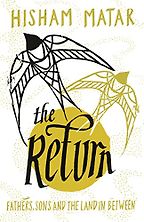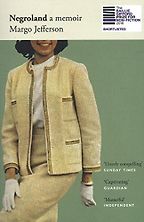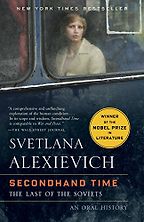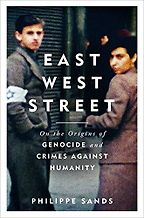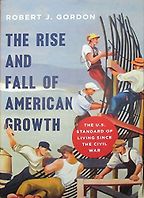I was really impressed with the books that you’ve chosen. They’re very readable and yet about various things that are really important that we understand. Is that what you had in mind when picking them?
The tradition of what was the Samuel Johnson Prize and is now the Baillie Gifford Prize for Non-Fiction is that these should be important books as well as standing on their own as well-crafted, nice-to-read books. That was applied particularly going into the shortlist. There were some excellent books in the longlist—there were a few that we said we might give to our friends for Christmas and, in fact, there are several that I’ve already given to friends—but they didn’t make it onto the shortlist because we felt there had to be something extra that made them important books, that helped them rise above a narrow subject, or a particular story they were telling.
“The tagline of the prize is “all the best stories are true.””
So, if you look on the longlist, there are, for example, some really nice biographies. We thought they were fantastic biographies but they weren’t able, necessarily, to stand on their own above their subject matter.
I thought it was quite interesting that three of the books you’ve chosen are memoirs, and a fourth is a weaving together of other people’s first-person stories. Do you find that having a nonfiction book told in the first person speaks to people more?
The tagline of the prize is “all the best stories are true.” There’s always a feeling that the books should have stories in them rather than just facts. I think it was accidental that some of the strongest books this year are in the first person, but it’s not accidental that that’s often where the best nonfiction comes from.
If you look back, in your own experience, at nonfiction books that have managed to hold a narrative and be really engrossing and as gripping as a novel, it tends to be because the writer has managed to find a personal connection or draws out personal stories. The classic person who does this is Michael Lewis. He really manages to popularize quite dense subjects, because he’s able to find individuals who embody the story.
These books are different but they have that same quality: they’re telling a story about the world—what you could loosely call current affairs, at least in the case of three of them—but they’ve found personal stories to run through that, so that it becomes something you’re really engaged in reading.
For somebody who doesn’t normally read non-fiction—which isn’t me, I hasten to add—which would you say is the easiest read?
I think The Return is probably the easiest read. It’s one of those books that you can sit and read, very easily, in one sitting. Hisham Matar is telling one story, rather than weaving together many different elements.
What’s it about?
It’s about a UK-based writer whose father disappeared in Libya. At the start of the book, he is about to go back to Libya, having left as a small child to go into exile. He’s interweaving his own journey to Libya, after the fall of Gaddafi, with the story of his father and his efforts to find the truth of what happened to him. At the start of the book, he is not 100% sure his father is dead — though he is assumed dead in one of Gaddafi’s prisons.
“It’s beautifully written. He’s a novelist.”
The story is gripping in itself and, although many books have been written about the Arab Spring and different regimes in the Middle East, I didn’t feel I had read such a personal story of Gaddafi’s Libya.
So his father was in opposition to Gaddafi, ended up in prison and was never seen again?
Basically, yes. He tries to piece together the story, talking to people who were in that particular prison. At various points they didn’t even know which prison he was in because he was being moved around. The regime, for a time, was not even confirming that he was in prison.
Get the weekly Five Books newsletter
It’s beautifully written. He’s a novelist. For me, it’s about the quality of the writing as well as the content, which is obviously very poignant. To have a novelist approach this subject made this a great book.
One added feature is his relationship with his father. The love between a father and a son comes out in a really beautiful way and without being too drippy.
What did it reveal to you about Libya that you didn’t fully appreciate before?
I feel Iran features a lot in stories and the popular imagination, and we also tend to be very focused on the Israeli-Palestinian conflict. Libya is not a country one has read or heard as much about. Gaddafi came across almost as a cartoon character, from a Not the Nine O’Clock News clip. He was the dictator that somehow had an almost comical status.
I don’t think it came into popular consciousness in the UK how bad he actually was. The relationship with the UK was also quite compromising. That comes through a bit in the book because Hisham tries to find out what happened to his father at the same time as Blair was having a partial rapprochement with Gaddafi. So there’s a little bit of tension with the British establishment. It’s a story that’s told much less often, and the way he tells it is beautiful.
You said there were two shortish books on the list. What’s the other one?
That’s the one by Margo Jefferson, Negroland: A Memoir.
This is the book about being black and upper class in America. I noticed she was born in 1947 so has lived through a lot.
Yes, so she’s writing about her upbringing and also the milieu that she came from, as a middle class African-American, living in Chicago. There are some overlapping themes in the other books but this one is completely different. It’s very much on its own. We tend to read about the civil rights struggle or the story of poor blacks in the South, but not so much middle class African-American society. It’s a side to American society that I didn’t know about.
We should probably add, at this point, that Negroland isn’t in Chicago. It’s not actually a place.
No, it’s a picture of successful, bourgeois, black American life, a place where you can do well as long as you accept that you’re still within constraints set by white society.
She starts off by going back a little into the history of bourgeois African-American families. There’s this constant sense that they’ve been allowed to succeed to a certain degree but are still, ultimately, facing the same prejudices and discrimination.
“She expresses very well that relative affluence but constantly bumping against the continued discrimination and bias.”
I interviewed Condoleezza Rice a couple of weeks ago. She grew up in the South, at the time of the civil rights movement. Her parents, I think, were a bit like Margo Jefferson’s parents, from a bourgeois family. But her parents told her very zealously that there was nothing you can’t achieve, and that you should believe you can get to the White House. Jefferson’s parents were a bit more ambivalent, more aware of the limits.
Jefferson writes it in a very personal way. She’s not just painting a portrait of her environment and her upbringing, she’s also talking about how she has developed as a person, the fact she ends up not having children and has chosen a certain life.
What are the best parts of the book?
When she is describing her childhood and the expectations people had of her. Little things. For example, her Mum comes out and stops them playing with the white girl next door, because she is getting them to play by being monkeys. They were very keen just to play, because it made them feel like they belonged, but this white girl was getting them to play a very racist game. She expresses very well that relative affluence but constantly bumping against the continued discrimination and bias.
She also describes being in summer camp and being one of very few black children at the camp. They were the most assimilated part of African-American society. It’s partly a story about assimilation, but also the limits to assimilation.
Let’s talk about the Svetlana Alexievich book next, Second Hand Time: The Last of the Soviets.
Svetlana won the Nobel Prize in Literature last year and there has been debate about whether her writing is literature, or pure reportage. We’re straddling that by putting her up for a nonfiction prize. It’s one of those books that, as judges, we were initially unsure how to respond to. The quality of the writing, the stories she tells, are very absorbing.
“It’s about how dark the lives are of some of those people, who were brought up in a completely different environment.”
She has done this before. In her book about Chernobyl, she collected the voices and stories of survivors of the Chernobyl disaster. In this book, she is talking to people across Russian society, all of whom have the feature of having been born, or lived most of their lives, in Soviet times. Those people are dealing with how fast the USSR collapsed, and Russian society.
The power comes from the stories themselves, the people she found and talked to. Some are in the Caucasus and different parts of the country, people trapped in different Republics, who then face terrible discrimination and have undergone horrible experiences. There are others who, at the time property rights were being established, had their houses or apartments stolen from them by mafia groups.
“Those people are dealing with how fast the USSR collapsed, and Russian society”
In some ways, this book is backward looking because it’s reminding people how fast Russia has changed and how many people that change has left behind. It’s about how dark the lives are of some of those people, who were brought up in a completely different environment.
The book doesn’t have a traditional narrative structure. It’s not one you read in a straightforward way. It’s one you dip into, or pick up and become absorbed by for an hour or so and then step away from. But as a piece of reportage, it’s an extraordinary achievement.
I was reading an extract from the book in the Times Literary Supplement. It was about some Tajiks—Muslims—in Moscow, being treated horrifically. There’s this sadness about the demise of the Soviet Union, a time when all ethnicities were part of one big project.
And that’s something that’s being grappled with across eastern Europe. These were regimes that delivered very little in economic terms and failed in lots of other ways, but, on some basic measures of equality: equal treatment of women, of minorities, or even access to universal health care, were ahead of Western society.
What does she mean by Second Hand Time? Does it mean we’re living through the same thing again?
I’ve been thinking about that. The way I read it is that these people are living a used existence, making good with second hand things from the old regime, rather than actually leading a new life.
One thing that comes up a few times is the idea that books are now the only things that people can afford because nobody values them anymore. They used to be a core part of entertainment and life, there was an obsession with literature in the old Russia. Now, books are literally two a penny, and the people who have no money can still buy books.
I loved one line she has in the book: “Only a Soviet can understand another Soviet.”
It’s one of those books where, if you’re highlighting, you end up highlighting loads and loads of quotes. There are so many redolent phrases.
I reread the book the other day. One fair criticism is that she doesn’t talk to anyone who has done well, or have any positive voices. It does get you down after a while. That’s another reason you probably wouldn’t want to sit down and read the whole thing in one sitting.
Don’t you think that, in the context of Russia being such a key international player, it’s an important book to read, to get a sense of what it’s like to be Russian?
I think that’s right. Westerners are shocked when Putin says the fall of the Soviet Union was the biggest disaster that ever befell Russia. We think of it as this great triumph for freedom. But one of the reasons Putin is so successful is that he is able to tap into that sense of humiliation, of national disaster. He has territorial ambitions, talks about restoring Russian greatness. Having read this book, you’d understand his support a lot better.
“Putin says the fall of the Soviet Union was the biggest disaster that ever befell Russia”
The people in the book are, in a sense, the silent majority. They have not been able to fully embrace the good things that have come out of the new Russia. They feel their lives have been stolen from them and if Putin promises to restore some element of that, even as he tanks the economy, that is appealing.
And it is a genuinely poignant book. You have older people talking about the moments of great excitement in their youth, like when Yuri Gagarin goes into space. “People went out into the streets laughing, embracing and crying. Strangers… It was an unforgettable moment! It took your breath away the awe. To this day I get excited when I hear this song…” It’s history from the inside, which is why it is both literature and non-fiction.
Let’s talk about your next book, East West Street: On the Origins of Genocide and Crimes Against Humanity by Philippe Sands.
This is a fantastic and very impressive book. He manages to maintain lots of different storylines through quite complex material, in a way that I found completely absorbing. He’s tracing the history of the notion of war crimes and genocide, through two lawyers who were most associated with the Nuremberg trials. They were not related to each other, and didn’t even knew each other very well, but they both came from the same town in Poland that his grandfather also came from.
This is Lviv, now in Ukraine.
Yes, and he starts off the book saying it’s been known by four different names, depending on whether it was part of Poland, Germany, Russia or Ukraine. That is part of the story, what happens to this town, particularly during the war.
“It’s like a detective story.”
It’s also telling a story of the Holocaust, and how his grandparents managed to escape Vienna quite late and get back to London. There are lots of unanswered questions and loose ends in the story that he gets told by his mother and his grandfather never talked about it. He follows up all of these loose ends, including trying to find the mysterious woman who saved his mother’s life by taking her, as a baby, across Europe, for what turns out to be bizarre motives.
Is it about the Nuremberg trials?
That’s its touchstone, but it doesn’t spend a lot of time on that. The Nazi lawyer who was in charge of that bit of Poland, his story and trial at Nuremberg is the thread that runs through the book. He is the one who has presided over sending a large number of people to concentration camps and being part of managing the machinery of the Holocaust.
“Our standard for the prize is that it should be an important book and rise above the narrow subject matter”
You wouldn’t read this book to get a history of the Nuremberg trials, or even, necessarily, to get a history of the idea of genocide or crimes against humanity. But all of these things come together around the personal story that he is tracing. And the fact that he is a very well known and accomplished lawyer in this field, to say the least, who has been tangentially involved in prosecutions of some recent war crimes, adds to it.
It’s like a detective story. You get the sense that he started off on this project and it absorbed more and more of his time. He was following up more and more of these stories from his personal life and then these turned out to relate, in interesting ways, to the big picture and the legal history that he was already familiar with as a lawyer in this field.
It’s quite a dense book, it’s probably the least easy to read of these books, but our standard for the prize is that it should be an important book and rise above the narrow subject matter. This book definitely does that.
Finally, let’s talk about The Rise and Fall of American Growth by Robert J Gordon. This is not up for the Baillie Gifford prize, but you chose it as the best non-fiction book in your own field, economics. In spite of its title, it doesn’t just apply to America, we can apply it to Europe as well, is that right?
Yes. There’s been a long debate in economics, especially since the crisis, around secular stagnation: this low growth world that we’re living in, is it permanent? Is there something structurally that’s going on that has made our economies less productive or is it just that governments aren’t spending enough money?
Robert Gordon has become associated with the view that technology is not really giving us the bang for its buck that it used to. In the past, you had really transforming technologies—like the flushing toilet—which did a lot more for mankind and economic growth worldwide than Facebook.
“In the past, you had really transforming technologies—like the flushing toilet—which did a lot more for mankind and economic growth worldwide than Facebook.”
In a way, his argument has been taken as technological pessimism. It’s been oversimplified in the way he’s talking about us reaching the end of growth. When you read this book, what he says is more nuanced than that. But what’s really interesting, why this book is really a fantastic read, is the way he goes through economic history, and points to how all the improvements—like the flushing toilet and having a washing machine in the house—changed people’s lives without really being reflected in economic statistics.
For me, the biggest takeaway from it is that now, when we’re so mesmerized by our own technological improvements and how our world has changed—how could we live before internet and smartphones—he shows really clearly, or at least makes a convincing case, that the living improvements and changes were much greater in the past. There’s nothing particularly special about what’s happening with the internet now.
“There’s nothing particularly special about what’s happening with the internet now”
If you want to read an economic history—certainly of America’s economy but also of developed economies over the last 150 years—he has lots of wonderful examples. He writes very well for an economist. It’s a good book.
Is it readable, for a non-economist?
Yes, it genuinely is. I always think the most readable and probably the most useful economics is economic history and this book makes that case extremely well.
Five Books aims to keep its book recommendations and interviews up to date. If you are the interviewee and would like to update your choice of books (or even just what you say about them) please email us at [email protected]
Five Books interviews are expensive to produce. If you've enjoyed this interview, please support us by donating a small amount.
